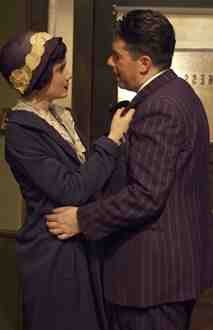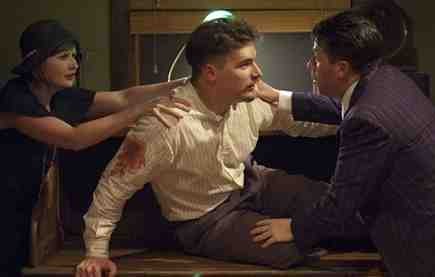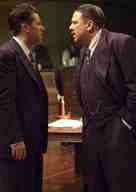Front Page at the Timeline In Chicago
Rahm Emanuel Understands the Play Perfectly
By: Susan Hall - May 28, 2011
The Front Page
By Ben Hecht and Charles MacArthur
TimeLine Theatre, Chicago, Illinois
Hildy Johnson P.J. Powers
Walter Burns Terry Hamilton
And Don Blair, Mike McNamara, Loen Lzerine, Michael Kingston, Larry Baldacci, Alex Goodrich, Mark Richard, Laurie Larson, John Gray, Malcolm Callan, Mechelle Moe, Bill McGough, Bridgette Pechman Olamo, Angela Bulard, Rob Riley, Rob Fagin
Director Nick Bowling
Set Collette Pollard
Costumes Lindsey Pate
Lighting Heather Gilbert
Photo credits Lara Goetsch
Extended through July 17th www.timlinetheatre.com
Helen Hayes, the great American actress who was married to Front Page co-author Charles MacArthur, wrote that her husband had learned to love life in Chicago. Perhaps for this reason the collaboration between Ben Hecht and MacArthur succeeds as an improbable love story. It may be a strange love story--full of hangings and cheating at cards and in life, but it is at the same time tender and true. In the hands of the TimeLine Theatre, Front Page comes off splendidly.
Tennessee Williams reported that MacArthur and Hecht had “taken the corset off American theater.” Almost a century after its liberating debut, the play is fresh, ribald and lusty.
Free at last, MacArthur and Hecht took a slice of life from the press room at a Cook County courthouse. Across the yard, Earl Williams is on death row, waiting to be hanged for the murder of a Negro police officer. The execution has been delayed to fall just a few days before an election. Two hundred thousand Negro votes are at stake. As it still is today, no deed is wrong when an election is at stake.
Hildy Johnson, star reporter, is trying to join his fiancé and her mother to leave journalism and take a job in advertising writing about ‘milady’s drawers.’ Accused of defecting for sissy stuff, P.J. Powers exuberantly portrays a wisecracking man in love. Turns out to be a love both for the emerging story and a young woman.
Terry Hamilton brings to the role of Walter Burns all the passion and manipulative talent of a managing editor, for whom newspaper journalism is the most important occupation in the world. All of his talents are deployed to keep Johnson woven into the press room.
On stage a chorus of reporters are playing cards while they take care of business, Hildy is departing for love and bourgeois security and one determined reporter is trying to move the execution up from 7am to 5am to meet the morning edition. This trio of storylines is played out simultaneously. TimeLine’s decision to mount the play in the round suits the busy interweaving of plot points.
Williams escapes jail. Hildy is hooked and can’t leave the scene. His fiance and her mother are furious. As the man hunt escalates, the sheriff hires 400 of his relatives to join in. A woman going into labor is picked up by one search crew, who deliver the 'pickaninny' and name the boy after the sheriff. Now we settle in.
If you haven't seen the play, or the two movies made based on the it, (the most recent with Jack Lemmon), it may be difficult to catch the rapid fire dialogue at first. But once you get into the rhythm, it is pure delight.
I sat facing a reporter's desk, and the space between audience and actors was entirely in the mind of the actor. I as audience felt thrust onto stage. The set featured a roll top desk, which was key to advancing the plot.
What a cast, each carving a character out of wit and sometimes even feeling for the accused ‘radical’ who accidentally murdered a man.
Not only is Chicago’s place at the acme to political manipulation displayed brilliantly, but also what Lionel Tiger defined at the heart of male bonding, and male power. This low brow joking and easy, breathless word play is still the prompt of mergers and acquisitions closings, and in the 24/7 rooms at Google and Apple.
Rosalind Russell played Hildy in one of the many film versions of the play, but she would be fired for sexual harassment if she behaved that way in today’s corporate world. The glass ceiling eludes in part because most women don’t bond by telling dirty jokes.
The Front Page presented a new kind of realism, a new language, and a new morality. We are listening to carefully carved pieces, but wit is not allowed to interfere with the drawing of character. A slice of life is given organic structure and specificity of dialogue topped off with an affectionate touch. It provokes a thoughtful response, but not because the play is heavy-handed or preachy.
The newshounds of Front Page are too scruffy to be heroes, but they are also too heroic to be villains. We ask in the end, does this quality define a good politician?
All the comic stops are pulled out as Hecht and MacArthur finally brought Aristophanes to the American stage. In Chicago, the actual setting inspires.





